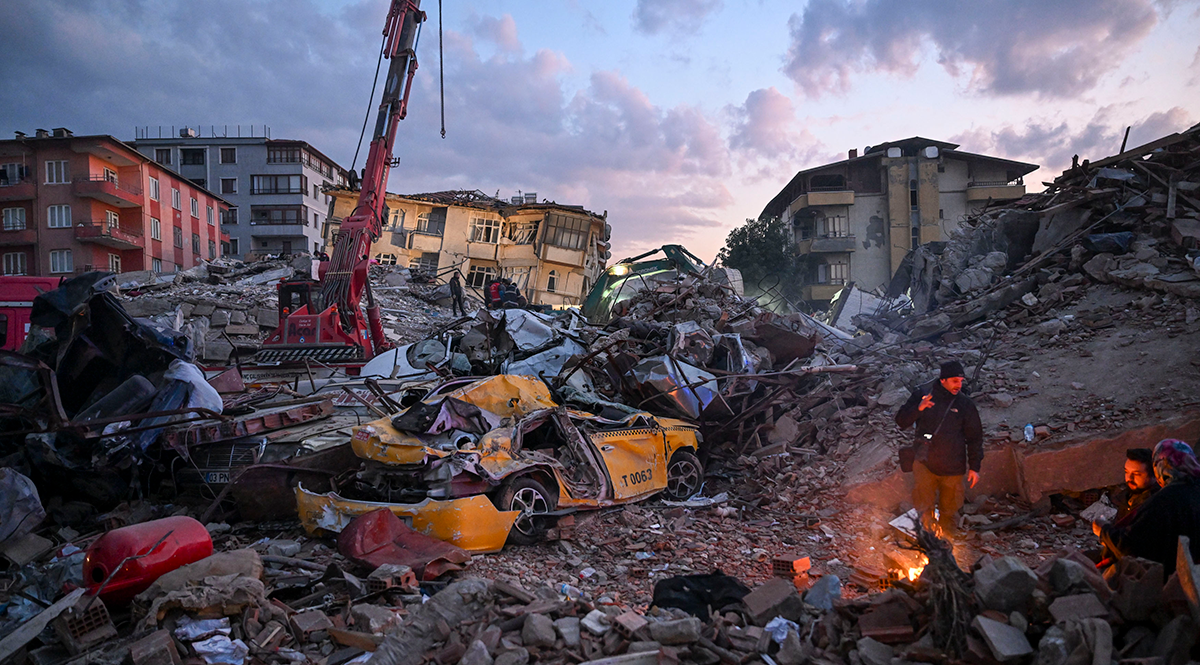An earthquake can be extremely destructive. The damage caused by an earthquake depends on its magnitude, the area it hits, and the type of terrain. An earthquake that occurs offshore can generate a tsunami, which can cause even more damage. The most destructive earthquakes happen when they strike densely populated areas. The 1906 San Francisco earthquake, for instance, killed more than 3,000 people and caused damage that totaled $524 million (in 2016 dollars). The 2010 Haiti earthquake killed more than 200,000 people and caused damage that totaled $7.8 billion. Earthquakes can also cause fires. The San Francisco earthquake of 1906, for example, ignited several fires that burned for three days and destroyed more than 4,000 buildings. Liquefaction, which is the shaking of the ground so violently that it turns to liquid, is another destructive force of earthquakes. This can cause buildings and other structures to sink into the ground. Earthquakes can also trigger landslides and avalanches. In 2015, an earthquake in Nepal triggered an avalanche on Mount Everest that killed at least 19 people. All of these destructive forces can result in widespread damage to infrastructure, including roads, bridges, and buildings. They can also disrupt
1-The Destruction Caused by an Earthquake
An earthquake can be a very devastating natural disaster. They can cause a lot of damage to buildings and other structures. They can also cause injuries and even death.
Earthquakes happen when two pieces of the earth’s crust collide. The force of the collision can cause the earth to shake. The shaking can cause buildings to collapse and can also create cracks in the ground.
Earthquakes can happen anywhere in the world. Some areas are more prone to earthquakes than others. California, for example, is a state that is very prone to earthquakes.
There are some things that you can do to try to stay safe during an earthquake. If you are inside a building, you should try to stay under a desk or table. If you are outside, you should try to stay away from buildings and power lines. You should also try to stay away from areas where there is a lot of traffic.
If an earthquake happens, it is important to stay calm. Try to stay safe and wait for the shaking to stop. Once the shaking has stopped, you can then assess the damage and see if you need to evacuate the area.
2-The Effects of an Earthquake
The effects of an earthquake can be devastating. The shaking can cause buildings to collapse, resulting in the loss of life and property. The damage can be widespread, affecting not only the immediate area but also surrounding regions.
Earthquakes can also cause fires, landslides, and tsunamis. The resulting damage can be extensive and costly to repair. In some cases, an earthquake can even trigger a volcanic eruption.
While the immediate effects of an earthquake can be devastating, the long-term effects can be just as destructive. Earthquakes can cause physical and psychological damage that can last for years. The emotional trauma caused by an earthquake can lead to anxiety, depression, and post-traumatic stress disorder.
Physical damage caused by an earthquake can include injuries, loss of property, and displacement. Many people who survive an earthquake are left homeless. In some cases, entire communities are destroyed.
The long-term effects of an earthquake can be difficult to cope with. The physical and emotional damage can take years to recover from. The economic damage can also be significant. In some cases, an earthquake can set a country back years, or even decades.
3-The Aftermath of an Earthquake
When an earthquake strikes, the damage it leaves behind can be catastrophic. Buildings can crumble, roads can buckle, and whole communities can be destroyed. In the aftermath of an earthquake, survivors often face a number of challenges.
The first challenge is simply staying alive. People can be buried alive under the rubble of collapsed buildings, and it can take days or even weeks for rescue workers to reach them. In the meantime, they may need to ration their food and water and try to stay as calm as possible to conserve energy.
Once people have been rescued from the rubble, they often face a second challenge: finding somewhere safe to stay. Earthquakes can destroy whole neighborhoods, leaving survivors homeless. They may need to stay in shelters or with friends or family members who live outside the affected area.
Even after the immediate danger has passed, life after an earthquake can be very difficult. People may need to deal with psychological trauma, as well as physical injuries. They may also need to find new jobs if their workplaces have been destroyed. And in some cases, they may need to relocate to a new city or country altogether.
The aftermath of an earthquake can be a long and difficult road, but with the support of family, friends, and the community, survivors can rebuild their lives.
4-The Recovery from an Earthquake
The Recovery from an Earthquake
As soon as the shaking from an earthquake subsides, people will want to start the recovery process. This can be a long and difficult task, depending on the extent of the damage. The first step is to make sure that everyone is safe and that there are no immediate dangers, such as fires or gas leaks. Once the immediate dangers have been dealt with, people can start to assess the damage and begin making repairs.
In some cases, the damage from an earthquake will be so severe that it will be impossible to stay in the affected area. In these cases, people will need to find alternative accommodation, which can be a challenge. There may also be problems with access to essential services, such as water and electricity.
The recovery process can be a slow and difficult one, but it is important to persevere. With time, people will be able to rebuild their homes and their lives.
